Collecting user data has grown into a billion-dollar industry. The EU's General Data Protection Regulation (GDPR) requires website owners to inform visitors about how they will be tracked, offering them an opportunity to opt-out. And cookie law is no joke either since failure to receive user permission to collect their data can result in hefty fines, like the $220 million one facing Amazon.
Cookie consent tools help ensure that your website conforms to the EU's GDPR as well as similar regulations elsewhere. Generally, this is done through a cookie banner or pop-up asking visitors to consent to the collection and usage of their data. These allow site owners to avoid infractions or fines. However, which cookie consent tool is the best?
Statistics: Cookie Consent Tools
We checked more than 5 million of the world's most visited websites to determine which cookie consent solutions they use. Below, we'll introduce you to our Top 5.
Osano
Osano describes itself as "the one platform for your privacy program" and is used by nearly 1/3 of the 5 million sites from our sample that have cookie compliance tools. Among these are some well-known companies like Bosch, Daimler, and SAP, however, there's also a free and open-source version.
For that reason, it's better to speak about Osano's apps: Developers and users can take advantage of the free, open-source cookie consent tool and create their own solution. At the same time, a paid cookie consent tool is also offered in the form of Osano Hosted Edition.
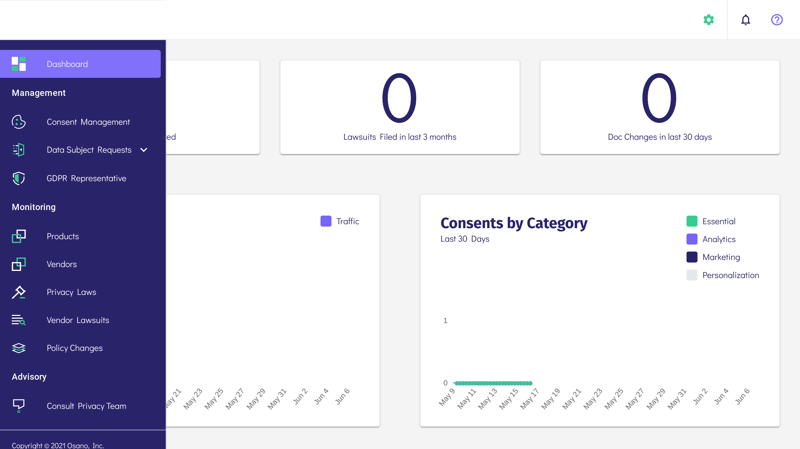
Osano's dashboard.
Paying subscribers have a number of different options to choose from. These vary depending on the number of monthly website users, domains, and other parameters. Osano advertises its conformity to the EU's GDPR, offering a GDPR representative for those willing to pay more. This means that Osano acts as your physical representative in Europe, should your business not have a European presence.
Osano can be added to any website using JavaScript, so all that's needed to meet the privacy requirements for a number of countries is a snippet of code.
The service automatically adjusts to the site visitor's language, opening a localized cookie pop-up. This makes Osano particularly interesting for businesses that operate around the world, giving it an advantage over some of the other tools we looked at.
Osano saves user content settings with blockchain. As such, consent can't be spoofed, while records are also maintained for site owners and operators should complaints ever be filed.
Customizable open-source version
Easy to add via JavaScript
Uses blockchain
Fairly expensive
Quantcast Choice
Like Osano, Quantcast is headquartered in the US. The provider offers all of the typical features of a cookie consent tool and conforms to the GDPR. Beyond that, Osano also meets the California Consumer Privacy Act's (CCPA) requirements. This regulates how companies handle the data of citizens of California, such as requiring their explicit permission for the sale of their data to third parties, and the right to request deletion of such data.
Quantcast also meets the European Transparency and Consent Framework (TCF) 2.0 standards, which makes it easier for publishers, website owners, and advertisers to display GDPR-compliant ads. Should the so-called TC string not be present (i.e., the website doesn't use a TCF-certified cookie consent tool), there's no guarantee that the ads in question are GDPR-compliant.
In its FAQs, Quantcast Choice goes into more detail about what TCF 2.0 includes. Beyond that, the service's admin portal allows users to monitor their consent rate, as well as assess whether the tool is up-to-date and conforming to the newest data privacy settings. If necessary, users can also make changes.
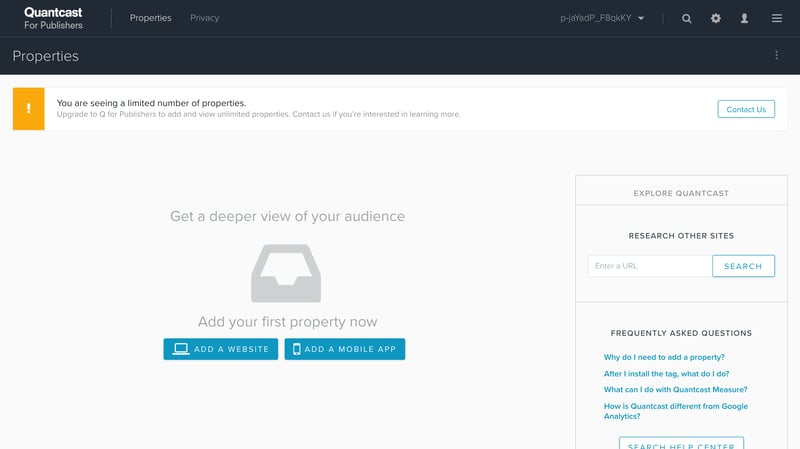
Quantcast Choice's clearly arranged admin portal makes it easy to gain an overview of consent on your website.
In addition to its admin portal, Quantcast Choice also allows users to apply the tool across an entire domain with just a few lines of code, opening a consent pop-up on every page. This provides users with greater insight into their site's visitors in real time.
Quantcast Choice's second place is not disputed, with it being one of the most popular cookie consent tools out there. There also isn't much separating it from Osano, and as a managed service, it enjoys the advantage of being completely free
Free
Clear and easy to use platform
Quickly integrates onto any website or domain
Language does not automatically change based on a user's location
OneTrust
OneTrust might be based in Atlanta, but the service also has an EU presence thanks to its offices in Munich and Paris. Describing itself as the "platform to build trust", it offers several data protection and security solutions alongside its cookie consent tool. These are easily combined and work well with one another.
OneTrust Cookie Consent meets all requirements of the GDPR, the CCPA, and the German Federal Data Protection Act (BDSG). Beyond that, users can ensure conformity with the Brazilian Data Protection Act (LGPD) if desired. Like Osano and Quantcast Choice, OneTrust is TCF 2.0 compliant.
In order to achieve all of this, OneTrust Cookie Consent blocks all trackers until a site visitor explicitly consents to them. With this feature, known as auto-blocking, it's also possible to block specific trackers, however, you'll need some coding know-how to do this.
OneTrust has a user-friendly interface. Thanks to its Cookiepedia database, it's possible to read up on cookies and trackers in easy-to-understand language
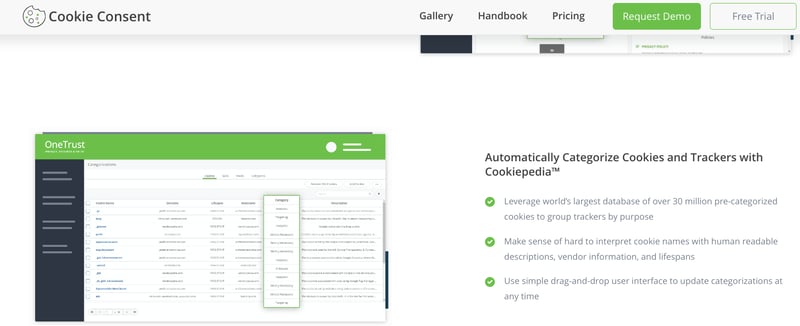
OneTrust impresses thanks to its user-friendly interface.
The tool also intuitively handles how cookie pop-ups are displayed on your website, making it possible to select from numerous templates and adjust them to your preferences. These automatically display in the site visitor's language and are optimized to meet local data protection regulations.
OneTrust, like Osano and Quantcast, is one of the most popular cookie consent tools. At least in part, this is because the tool is completely free for the first domain.
Clear and easy to use
Free for the first domain
Offers plenty of customization options
Unclear pricing structure
Cookiebot
The first purely European provider on our list is Cookiebot, offered by Cybot, from Denmark. Cookiebot emphasizes its GDPR, CCPA, and ePrivacy compliance. Anyone can test whether their website conforms to these on its landing page. As might be expected, Cookiebot offers all of the features expected of a cookie consent tool: a cookie banner that blocks cookies until users have consented to them.
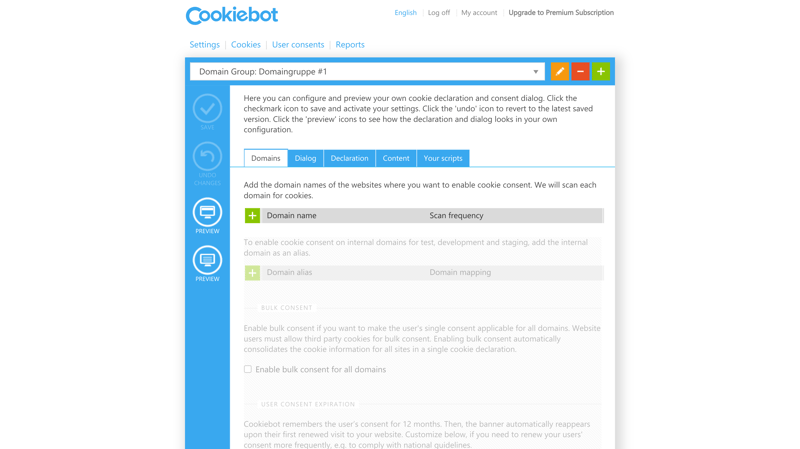
Cookiebot offers all of the typical features expected from a cookie consent tool.
Owing to its European roots, Cookiebot ensures that its users conform to the GDPR. Beyond that, the tool comes with a cookie database where users can manage cookies. Automatically adjusting the language in which the cookie banner is displayed to that of the visitor using geo-data, can also be enabled.
Cookiebot has been TCF 2.0 compliant since 2020, while also offering users the ability to completely block certain cookies on their website. Integrating the service is fairly easy: All you have to do is insert two lines of JavaScript code on your domain.
Even though it's "only" fourth in terms of popularity, Cookiebot is still an excellent option, and like OneTrust, free for the first domain. After that, users will have to pay $13 to $55 per month.
Caters to European users
Easy to integrate
Competitively priced
Offers few additional features
Iubenda
Iubenda, from Italy, rounds out our list of the Top 5 most popular cookie consent tools. The service can be configured to solicit GDPR, CCPA, and LGPD compliance, blocking all cookies before users consent to them. In addition, TCF 2.0 is also integrated.
With its visually appealing interface, Iubenda can be easily handled, giving users plenty of options for ensuring banner compliance with local and international laws. Banners can be displayed in eight different languages, however, automatically changing these to the visitor's location or even certain regions isn't possible.
The tool's developers emphasize their quick reactivity to legal changes and notifications outlining these to users. Alongside its cookie consent tool, the provider also offers a Terms & Conditions generator, as well as a Privacy Policy Generator, both of which guarantee that users are on solid legal ground.
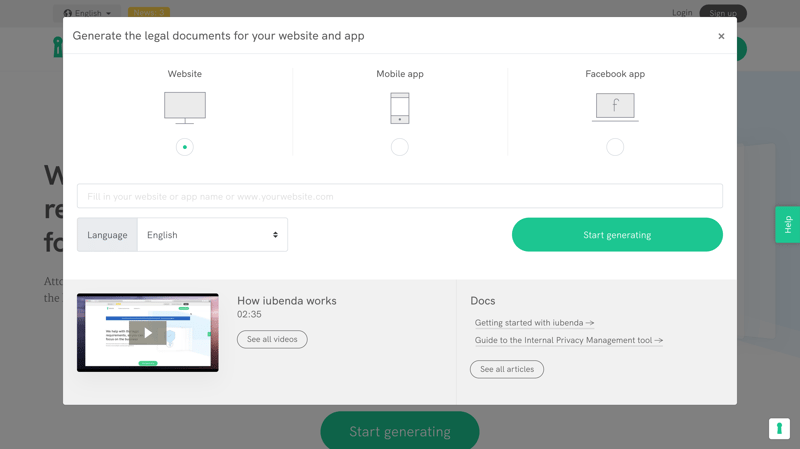
Iubenda rounds out our list of the Top 5 most popular cookie consent tools.
Iubenda costs vary from $5.99 to $99.99 depending on which package you select.
Complete package to ensure a website's legal conformity
Plenty of customization options
Simple Terms & Conditions and Privacy Policy generators
Unclear pricing structure
Overall Result
Osano and Quantcast Choice were the two most frequently used cookie consent solutions in our sample, thanks to their intuitive dashboards, ease of use, and open-source (Osano) or managed versions (Quantcast Choice). However, the other services weren't far off the mark: So far as user-friendliness, additional features, and price are concerned, there isn't too much separating any of the tools we looked at.
Conclusion
Integrating the right cookie consent tool into your website helps ensure a sound legal footing. Should you not solicit visitor consent before using trackers and cookies, you can be in for a hefty fine.
Over the past few years, the cookie consent tool market has opened up and is less clear as a result. Our comparison has briefly shown the strengths and weaknesses of the Top 5 most popular tools, allowing you to weigh the advantages or disadvantages of each in determining what's best for your site.
FAQs
Osano took first place in our ranking of the Top 5 most popular cookie consent tools. We were able to identify Osano on around one-third of all pages from our sample (the world's 5 million most visited websites).
Selecting the right cookie consent tool depends on your requirements. All of the solutions we looked at differ in terms of the additional features they offer, user-friendliness, and price. Also consider how many domains and sub-pages you have, what features you'd like, and which parts of the world your visitors come from.
EXPERTE.com's Technology Check makes it easy to find out exactly which cookie consent tool (or other integration) a website is using.











